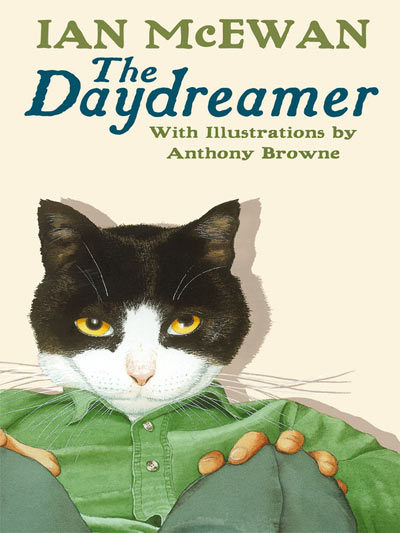当前位置: Language Tips> 英语学习专栏
很难想象以阴郁和压抑的叙事风格而为人所知的英国当代著名作家伊恩•麦克尤恩会写一本睡前故事书。在《梦想家彼得》中,那种若无其事的叙事口吻、缓慢渐进的叙事节奏,以及返璞归真的想象力,都证明了麦克尤恩是一位收放自如的成熟作家。书中借彼得的视角探讨了爱、死、痛、理解、灵魂等深层次的主题,但本期选段首先带我们走进这位十岁儿童的奇异世界,探究在他寡言少语的外表下究竟隐藏着怎样一颗童真的心。

By Ian McEwan
安妮 选 言佳 译
|
When Peter Fortune was ten years old grown-up people sometimes used to tell him he was a “difficult” child. He never understood what they meant. He didn’t feel difficult at all. He didn’t throw milk bottles at the garden wall, or tip tomato ketchup over his head and pretend it was blood, or slash at his granny’s ankle with his sword, though he occasionally thought of these things. Apart from all vegetables except potatoes, and fish, eggs and cheese, there was nothing he would not eat. He wasn’t noisier or dirtier or more stupid than anyone he knew. His name was easy to say and spell. His face, which was pale and freckled , was easy enough to remember. He went to school every day like all other children and never made that much fuss about it. He was only as horrid to his sister as she was to him. Policemen never came knocking at the front door wanting to arrest him. Doctors in white coats never offered to take him away to the madhouse. As far as Peter was concerned, he was really quite easy. What was difficult about him? It was not until he had been a grown-up himself for many years that Peter finally understood. They thought he was difficult because he was so silent. That seemed to bother people. The other problem was he liked being by himself. Not all the time, of course. Not even every day. But most days he liked to go off somewhere for an hour to his bedroom, or the park. He liked to be alone and think his thoughts. Now, grown-ups like to think they know what’s going on inside a ten-year-old’s head. And it’s impossible to know what someone is thinking if they keep quiet about it. People would see Peter lying on his back on a summer’s afternoon, chewing a piece of grass and staring at the sky. “Peter, Peter! What are you thinking about?” they would call to him. And Peter would sit up with a start . “Oh, nothing. Nothing at all.” Grown-ups knew that something was going on inside that head, but they couldn’t hear it or see it or feel it. They couldn’t tell Peter to stop it, because they did not know what it was he was doing in there. He could have been setting his school on fire or feeding his sister to an alligator and escaping in a hot air balloon, but all they saw was a boy staring at the blue sky without blinking, a boy who did not hear you when you called his name. As for being on his own, grown-ups didn’t much like that either. They don’t even like other grown-ups being on their own. When you join in, people can see what you’re up to . You’re up to what they’re up to. You have to join in, or you’ll spoil it for everyone else. Peter had different ideas. In fact, he thought, if people spent less time joining in and making others join in, and spent a little time each day alone remembering who they were or who they might be, then the world would be a happier place and wars might never happen... The trouble with being a daydreamer who doesn’t say much is that the teachers at school, especially the ones who don’t know you very well, are likely to think you are rather stupid. Or, if not stupid, then dull. No one can see the amazing things that are going on in your head. A teacher who saw Peter staring out the window or at a blank sheet of paper on his desk might think that he was bored, or stuck for an answer. But the truth was quite different. For example, one morning the children in Peter’s class were set a maths test. They had to add up some very large numbers, and they had twenty minutes to do it. Almost as soon as he had started on the first sum, which involved adding three million five hundred thousand, two hundred and ninety-five to another number almost as large, Peter found himself thinking about the largest number in the world. He had read the week before about a number with the wonderful name of googol . A googol was ten multiplied by ten a hundred times. Ten with a hundred noughts on the end. And there was an even better word, a real beauty—a googolplex . A googolplex was ten multiplied by ten a googol number of times. What a number! Peter let his mind wander off into the fantastic size of it. The noughts trailed into space like bubbles. His father had told him that astronomers had worked out that the total number of atoms in all the millions of stars they could see through their giant telescopes was ten with ninety-eight noughts on the end. All the atoms in the world did not even add up to one single googol... If you asked someone for a googol of chocolate-covered toffees, there wouldn’t be nearly enough atoms in the universe to make them. Peter propped his head on his hand and sighed. At that very moment the teacher clapped her hands. Twenty minutes were up. All Peter had done was write out the first number of the first sum. Everyone else had finished. |
彼得•福琼十岁时,大人们有时候会跟他说,他是个“麻烦的”孩子。彼得一直不明白他们是什么意思。他觉得自己一点儿也不麻烦。他没有往院墙上摔奶瓶,或把番茄酱往头上一倒假装流血,又或用玩具短剑砍奶奶的脚踝,尽管有时候他也想过做这些事。除了所有蔬菜(不包括土豆)、鱼、鸡蛋和奶酪,没有什么他不吃的。与他认识的其他孩子相比,他没有更爱吵闹、更脏或者更笨。他的名字好念好拼写,他脸色苍白、长雀斑,别人很容易记住他那张脸。他跟别的孩子一样天天去上学,也从来没闹过别扭。他对妹妹态度差劲,但妹妹对他也好不到哪儿去。警察从来没有敲过他家大门,想把他抓走。穿着白大褂的医生从来没有提出要把他带走关进疯人院。从彼得的角度上来看,他真的挺省事了。他究竟有啥麻烦的呢? 直到彼得自己长大成人后好多年,他才终于明白。大人们觉得他麻烦,是因为他的寡言少语。沉默似乎总让人不放心。而且还因为他喜欢一个人呆着,当然不是整天整夜都这样。可是大多数时候,他喜欢在自己的卧室或是公园呆上一个小时。他喜欢自个儿呆着想事情。 如今,大人们倾向于认为自己知道一个十岁孩子的小脑袋瓜里在想些什么,但如果一个人不把自己的想法告诉别人,别人就无从得知。在夏日的午后,人们会看到彼得仰面躺着,嘴里嚼着一根草,盯着天空看。“彼得,彼得!你在想什么?”大人们喊着他的名字。彼得一惊之下坐了起来,答道:“哦,没什么,我没在想什么。”大人们知道他的脑袋里肯定在想东西,可是他们听不到、看不到,也感觉不到。他们没法让彼得停下来,因为他们不知道他脑袋里在琢磨什么。他有可能在想放火烧学校,或者把妹妹扔给鳄鱼吃,然后从热气球上逃走,但是他们所能看到的,只不过是一个直勾勾地盯着天空看的男孩,一个听不到别人喊他名字的男孩。 大人们也不是很喜欢让他独处。他们甚至不喜欢让别的大人独处。当你加入他们的群体时,他们就能知道你的一举一动。他们做什么,你也依葫芦画瓢。你还必须得加入他们的群体,否则别人会不高兴。然而彼得对此有不同的看法。他认为,如果人们在加入某一群体或强迫别人加入自己的群体上少花费些时间,那么这个世界或许就能多一些欢声笑语,战争也就不会爆发…… 作为一个爱做白日梦且话不多的人,彼得遇到的一个大麻烦是:学校里的老师们,特别是那些不是很了解你的老师,很可能会认为你很笨。即使不是笨的话,那也是个没劲的人。没人能看到彼得脑袋里上演着的五彩缤纷之事。老师看到彼得盯窗户外面或者书桌上的一张白纸,也许会认为他感到无聊,或者想不出答案。可事实完全不是这样的。 例如,有一天上午,彼得的班上进行数学测验,测验内容是非常大的数字的加法,需要在20分钟内完成。彼得在开始做第一道算术题时——把3,500,295和另外一个几乎同样大的数字相加——他就不由自主地想到了世界上最大的数字。一个星期前,他读到了拥有一个美妙名字的数字——“古戈尔”,即10的100次方。10跟着100个零!还有个更好的词,真正迷人的词——“古戈尔普勒克斯”,1个古戈尔普勒克斯是10的古戈尔次方。多了不起的数字啊! 彼得由着自己的心思飘进这个数字奇妙的长度里,那一串零像泡泡似的延伸到太空中。他父亲告诉他,宇航员们通过巨大的望远镜看到了成百上千万的星星,他们已经计算出组成这些星星的原子的总量,即1098个。世界上的原子总量也没有一个“古戈尔”大……如果你想要一“古戈尔”巧克力太妃糖,那么整个宇宙的所有原子几乎都不够用的。 彼得用手撑着脸颊,叹了一口气。就在这一刻,老师拍了拍手,提醒同学们20分钟已经到了。彼得只写下了第一道计算题的答案,但其他的同学都做完了。 (来源:英语学习杂志 编辑:丹妮) |
|
Vocabulary: 1. tip: 倒出,倾倒;slash: (用利器)砍,劈。 2. freckled: 长雀斑的。 3. make a fuss: 吵吵闹闹,小题大做。 4. start: n. 惊吓,吓一跳。 5. alligator: 短吻鳄。 6. be up to: 〈口〉做(某事),干(某事)。 7. spoil: 糟蹋,破坏。 8. stuck: 〈口〉难住的,没有办法进行下去的。 9. googol: 〈数〉古戈尔,即10的100次方。 10. nought: 〈数〉零。 11. googolplex: 〈数〉古戈尔普勒克斯,即10的古戈尔次方。 12. trail: 拖沓地走,慢吞吞地走;bubble: 气泡。 13. prop: 支撑,把……靠在……上。 14. clap: 拍手,鼓掌。 |
上一篇 : 艾玛•沃森:打破“赫敏”魔咒
下一篇 : 对祖父的甜蜜回忆
关注和订阅


电话:8610-84883645
传真:8610-84883500
Email: languagetips@chinadaily.com.cn